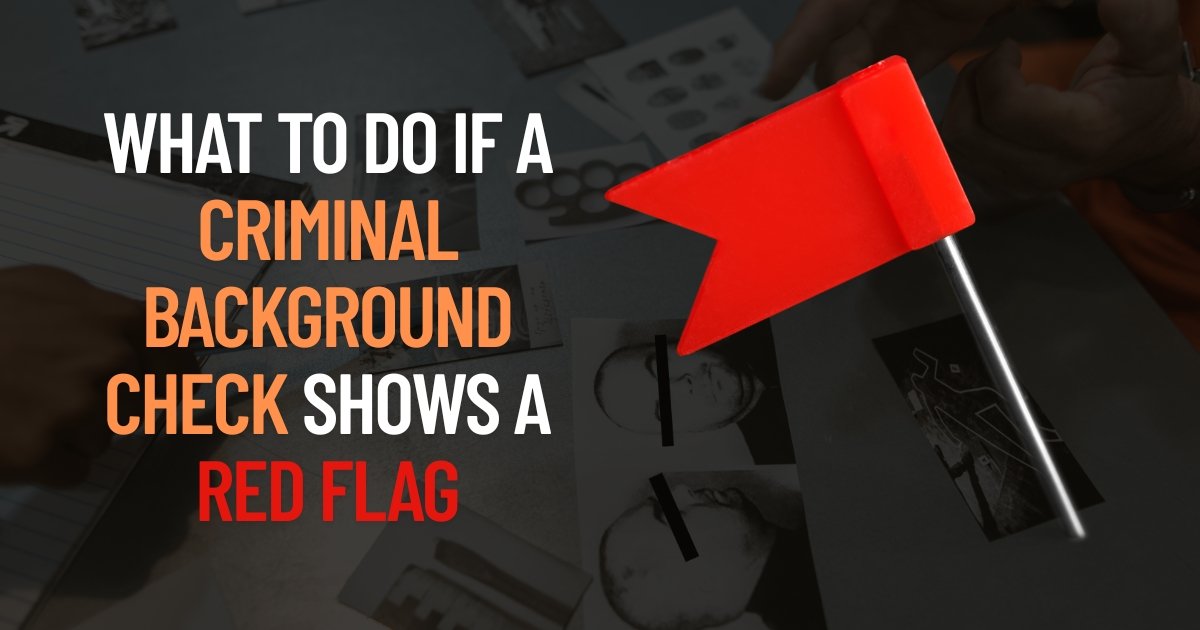What to Do if a Criminal Background Check Shows a Red Flag

It’s common to do a criminal background check for hiring, renting, or even volunteering in today’s fast-paced world. The checks make sure people are safe, protect their reputations, and verify their trustworthiness. Sometimes, however, they uncover information that makes you uncomfortable. If a criminal background check shows a red flag, you need to know what to do. It can save time, prevent misunderstandings, and guide future decisions if you address red flags right away.
From understanding the red flags to handling them professionally, we’ll cover all the essential points for individuals, businesses, and enterprises.
How Does a Criminal Background Check Work?
The purpose of a criminal background check is to look up a person’s criminal history. It usually involves searching public records, police reports, court records, and other databases to find out if they’re guilty or not. Using this process, organizations can make sure potential employees are safe, trustworthy, and credible.
A red flag in this context indicates a criminal record that might affect a person’s ability to get a job, a rental agreement, or other opportunities. What to do depends on the severity and relevance of the problem.
Are there any red flags in a criminal background check?
The red flags in a criminal background check depend on the crime and the position or opportunity. Common red flags include:
- A felony conviction is a serious crime like assault, theft, or drug trafficking.
- Charges pending – Ongoing legal proceedings that may be unresolved.
- Charges related to domestic violence that could affect workplace safety.
- Convictions for fraud, embezzlement, or money laundering.
- Charges related to drugs.
Knowing these red flags is crucial for individuals and businesses. So, what should you do if a criminal background check shows a red flag?
Red Flags and What to Do
The appropriate action depends on the severity of the red flag and your role – whether you’re a business owner, employer, or individual.
Make sure you read the report thoroughly
You have to make sure the report is accurate. Mistakes happen, and a red flag could be based on outdated or incorrect information. Check the report twice for errors. You can dispute discrepancies with the background check provider if a criminal background check shows a red flag. If an error is found, you can request a reevaluation with reputable providers like Crimcheck Canada.
Getting the context right
Examine the context behind the red flag after you’ve verified the background check is accurate. Is the charge related to an old situation that no longer applies? For example, someone convicted of a minor offense years ago might have rehabilitated. If you’re deciding whether to move forward with a person, this context can be crucial.
Transparency is key
You should approach the red flag transparently if it involves an applicant or individual you’re evaluating. Ask them about it, and let them explain. Communication can help you understand the situation better, and reveal whether the person has changed or if the past is a legitimate issue.
Analyze the relevance
It’s important to figure out what the red flag means for the job or opportunity you’re applying for. For instance, a minor conviction won’t matter for some jobs, but a serious crime might. Depending on the role and the risk, it might be okay to make exceptions sometimes.
Don’t be afraid to ask for legal advice
It’s always a good idea to consult a lawyer if you’re unsure about a red flag’s legal implications. In some cases, certain convictions may not be legally relevant to the position or role, and a lawyer can help clarify this. They can give insight into how the information affects hiring or other decisions.
Employers’ perspective on red flags in criminal background checks
A criminal background check with a red flag should make you cautious and fair if you’re an employer. It’s important to protect your company and workforce, but it’s also important to avoid discriminatory practices. Here’s what you gotta do if a criminal background check shows a red flag.
Follow the law
If an employer looks at a candidate’s criminal history, it must abide by Canadian law. Employers have to make sure they don’t unfairly discriminate against candidates with criminal records, according to the Human Rights Act and the Criminal Code. The offense should be relevant to the job. For instance, fraud convictions aren’t relevant to non-financial jobs.
Make sure your evaluation is fair
Whenever a red flag appears, take all factors into account, such as the nature of the crime, how long ago it happened, and the candidate’s qualifications. Make sure you don’t make hasty decisions. Also, see if the candidate has completed any rehab programs or gained any work experience to show growth and change.
Give a second chance
There are times when people deserve a second chance. If it doesn’t impact the person’s ability to do the job, give them a chance. Employers who follow fair practices can turn criminals into valuable employees.
The Candidate gets notified
Let candidates know why you didn’t hire them after a criminal background check. Transparency is key. Let them know why your decision was made and allow them to dispute any errors.
Red Flags in Criminal Background Checks: Individuals’ Perspectives
A red flag on a criminal background check can be unsettling. It may feel like a barrier to employment or other opportunities. However, there are things you can do if this happens.
Get to know your rights
In Canada, you have the right to know what’s on your criminal record. If you see something you don’t like, request a copy of your report. Be aware of what information is being shared and make sure it’s accurate.
Let’s talk about it
Be proactive if you have a red flag in your background. Don’t be afraid to speak honestly about it and prove that you’ve tried to rehabilitate or move on. Employers like people who are transparent and take responsibility for their mistakes.
Get your record expunged
Get legal advice on whether you qualify for expungement or pardon if you’ve been convicted of a crime.
Consult a pro
Consider consulting a lawyer or a background check service, like Crimcheck Canada, if the red flag is affecting your personal or professional life.
Criminal background checks: pros and cons
Understanding the pros and cons of criminal background checks is helpful when deciding what to do.
The pros:
- Ensures safety: Background checks keep businesses safe.
- They build trust between employers and employees or landlords and tenants.
- It minimizes the risk of hiring someone with a criminal record.
- Helps businesses comply with industry standards and regulations.
The cons are:
- Concerns about privacy: Some people may feel violated.
- It’s possible for background checks to produce inaccurate or outdated information.
- If not reviewed properly, a red flag might unfairly impact someone’s future.
What to do if a criminal background check gives you a red flag
As a result, what to do if a criminal background check shows a red flag depends on a lot of things. It’s important to stay informed, approach things thoughtfully, and act fairly, whether you’re an employer or an individual. By doing so, you’re making sure both safety and fairness are upheld. If you don’t know what to do, legal professionals or background check experts like Crimcheck Canada can guide you through the process. And also you reach to our Facebook page.
When it comes to criminal background checks, be proactive, review the info, and make informed decisions.




